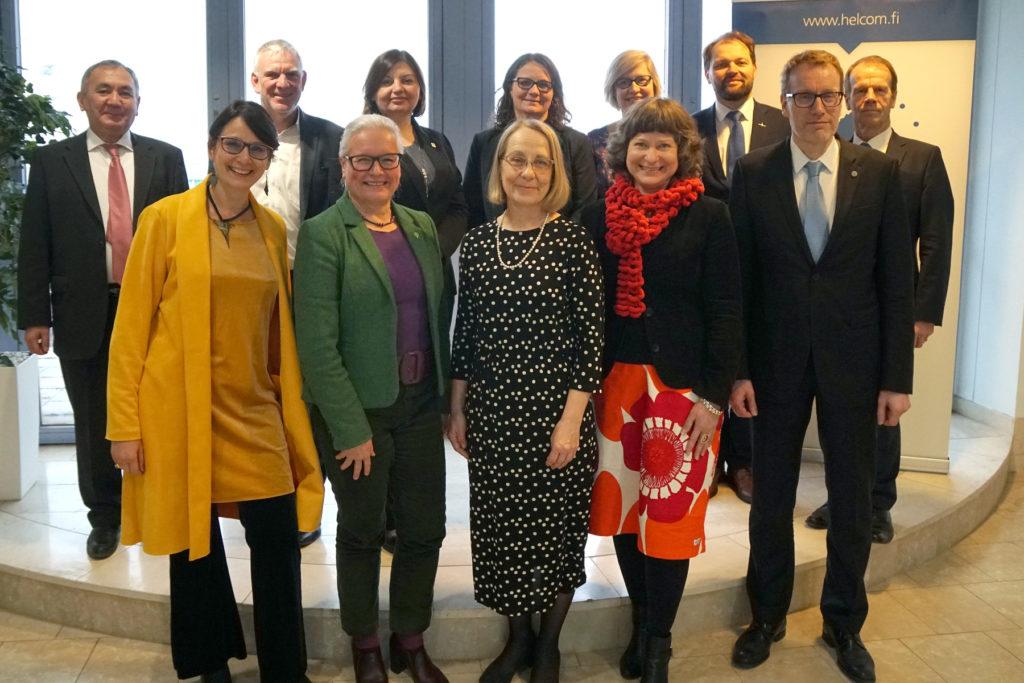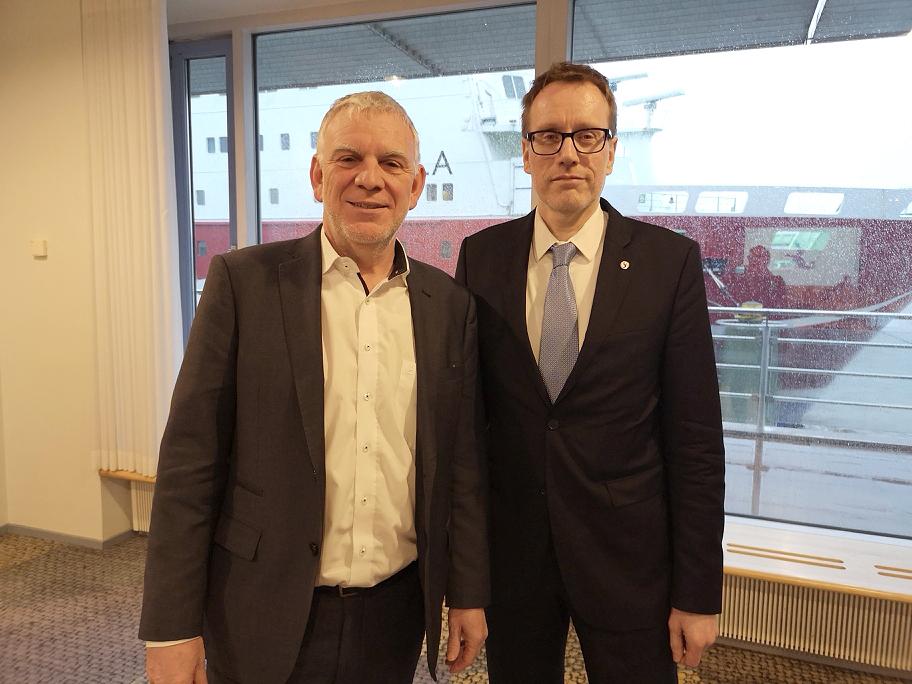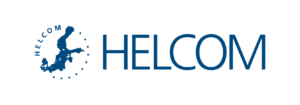
Back row, from left to right: Nuritdin Inamov (Russia), Jochen Flasbarth (Germany), Katarzyna Krzywda (Poland), Katrine Nissen (Denmark), Silvija Nora Kalnins (Latvia), Vitalijus Auglys (Lithuania) and Harry Liiv (Estonia).
Front row, from left to right: Veronica Manfredi (EU), Gunvor G. Eriksson (Sweden), Saara Bäck (Chair of HELCOM), Terhi Lehtonen (Finland), Rüdiger Strempel (Executive Secretary of HELCOM).
Actions for a healthier Baltic Sea and HELCOM’s Voluntary Commitments to the UN Ocean Conference 2020 were addressed in Helsinki during the Annual Meeting of the Helsinki Commission – the 41st Meeting of the Baltic Marine Environment Protection Commission (HELCOM 41-2020) – that took place from 4 to 5 March 2020.
The Baltic Sea Action Plan (BSAP) and its update were one of the central themes of the event that also featured a high-level segment attended by high-level representatives such as state secretaries and other high-ranking ministerial representatives of the Baltic Sea countries and the EU. Only Ministerial Meetings rank higher on the HELCOM meeting scale.
“Building on the political will expressed by the ministers in 2018, we are now progressing from words to action, as 2019 marked the beginning of more concrete work on the new BSAP,” said Rüdiger Strempel, the Executive Secretary of HELCOM, in his statement.
Initially set to achieve its objectives by 2021, the BSAP is due to be updated in 2021 as mandated by the HELCOM Contracting Parties during the Ministerial Meeting held in Brussels in 2018. The past months were characterized by translating the political will expressed in 2018 into a concrete roadmap and actions towards the update, such as the analysis of sufficiency of existing measures.
In Helsinki, the high-level representatives recognized that clear progress has been made under the current BSAP during the past 13 years. However, they also acknowledged that the level of implementation has not been fully satisfactory and stressed the need to ensure and accelerate the implementation of the actions under both the current and updated BSAP.
Nevertheless, the BSAP remains one of the most effective instruments for a healthy Baltic, offering a long-term vision and strategic orientation, as well as a wide array of science-based actions and measures. The updated BSAP is expected to include considerations on climate change, marine litter, pharmaceuticals, underwater noise, and loss of and disturbance to the seabed, among other pressures.
At HELCOM 41-2020, the representatives particularly highlighted the importance of recognizing climate change as a cross-cutting topic and the need for more knowledge on the impacts and consequence of climate change, therefore regarding the BSAP as an “instrument to strengthen the resilience of the Baltic Sea ecosystem and minimize negative effects of climate change on society,” as stated in the meeting outcome.
Based on the existing plan, the update will maintain at least the same level of ambition as the current plan and include all actions and measures from that plan that have not been implemented yet.
The outcome of the HELCOM Stakeholder Conference 2020, held the day before HELCOM 41 and aimed at gathering input from stakeholders on the BSAP update and that was, was also presented during the session of the high-level representatives who particularly lauded the quality of the engagement of the stakeholders. A total of 49 potentially new BSAP actions were proposed during the event.
Furthermore, at HELCOM 41-2020, the representatives agreed on submitting five Voluntary Commitments by HELCOM to the 2020 UN Ocean Conference, concurring on:
- updating of the Baltic Sea Action Plan by 2021,
- the development of a HELCOM Science Agenda to contribute to the UN Decade of Ocean Science,
- strengthening cooperation with other Regional Seas Organisations,
- offering strong support for global efforts to address the marine litter problem on a global level, and
- organizing a workshop on ecosystem-based management in support of the UN Decade of Ocean Science.
The voluntary commitments are part of HELCOM’s concrete efforts on global outreach and on advancing the global ocean agenda.
During the meeting, a number of HELCOM Recommendations were also adopted or revised by the Contracting Parties, such as the Recommendation on Deep-Sea Pilotage in the Baltic Sea (Recommendation 41/1) and the HELCOM Recommendation on the use of national manure standards (adopted in principle).
A roadmap on the collection of fisheries data to assess incidental bycatches and fisheries impact on benthic biotopes in the Baltic Sea was also agreed on during the meeting, as was the project proposal on the monitoring of pollution loads to the Baltic Sea (PLC-8).

HELCOM 41-2020 also saw the nomination by Germany of Lilian Busse, Head of the Division of Environmental Health and Protection of Ecosystems of the German Environment Agency, as Chair of the upcoming German chairmanship. Germany will take over from Finland on 1 July 2020, for a period of two years.
The representatives further took note of Germany’s will to increase the political visibility of HELCOM work during its chairmanship, with the BSAP being at the centre of the work, further supporting the Parties in its implementation, and extending invitations to civil society and stakeholders to participate in HELCOM processes.
The high-level segment of HELCOM 41-2020 was attended by Katrine Nissen (Denmark), Harry Liiv (Estonia), Veronica Manfredi (EU), Terhi Lehtonen (Finland), Jochen Flasbarth (Germany), Silvija Nora Kalnins (Latvia), Vitalijus Auglys (Lithuania), Katarzyna Krzywda (Poland), Nuritdin Inamov (Russia) and Gunvor G. Eriksson (Sweden).

